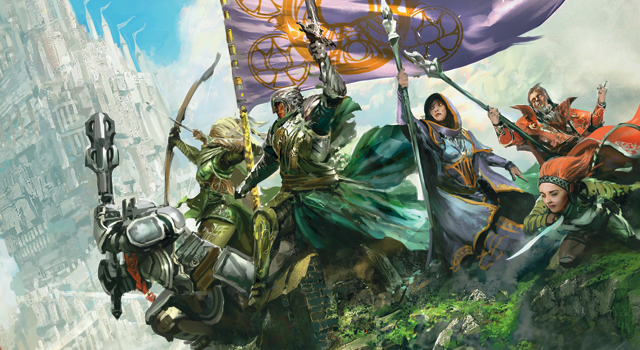Re: Is there a Difference between U.S. and U.K. Players and
Posted: Tue Nov 01, 2016 4:04 pm
Don't know about "people" but I keep saying that because I don't know any better. Guess you are right but I haven't given it a thought yet.
https://forums.cubicle7.co.uk/
The regions of Eriador (with the exception of The Shire) feel very medieval in character, as does much of Wilderland. It's the southern lands of Gondor that seem more classical to me.Stormcrow wrote:Why do people keep saying "medieval"? Middle-earth does not seem medieval to me. Its technology, politics, and social orders seem much more like classical antiquity, except for the Shire and Bree which resemble 19th century England.
Erland Hakon wrote:I think what you say is correct but with a little different nuance, for me the point is not "players could immerse even more into a medieval world" but "players could immerse into a medieval world with a different level of voluntary suspension of disbelief"... and this is what can result in different styles of play.


Yes, well, I suppose that's the whole question of the thread--maybe for you it is voluntary, maybe for others it is subconscious. For some gaming style might be a product of cultural, historical, and personal influences, a reflex.Erland Hakon wrote:In my opinion it is not metaphysical or philosophical at all.
For me they are not in the same level of voluntary suspension of disbelief play with a character of this group:
instead one of this other:
Interesting--would love to read the source there?Stormcrow wrote:Tolkien says that the moment a reader has to suspend his disbelief is the moment the creator of the secondary world has failed at his art. A successful author creates a secondary world that the reader willingly enters and accepts, because the art of its creation was great enough that the reader doesn't (secondarily) disbelieve it.
I'm struggling to wrap my head around this and get thoroughly where you're coming from.Stormcrow wrote:Role-playing games are not stories. Nobody is drawn in by your alleged acting ability. Your purple prose is obviously amateur and derivative. The skill of the game master is in the weaving together of various characters and events in a way that makes them interesting for the players to interact with. If you suddenly break character you haven't spoiled the secondary world. There are areas of overlap; both well-told stories and successful RPGs have people who invest secondary belief in them, but the nature of that belief is totally different. These are very different Arts.
Tolkien's essay "On Fairy Stories," found in a couple of different published books.cuthalion wrote:Interesting--would love to read the source there?
Children are capable, of course, of literary belief, when the story-maker's art is good enough to produce it. That state of mind has been called 'willing suspension of disbelief.' But this does not seem to me a good description of what happens. What really happens is that the storymaker proves a successful 'sub-creator.' He makes a Secondary World which your mind can enter. Inside it, what he relates is 'true': it accords with the laws of that world. You therefore believe it, while you are, as it were, inside. The moment disbelief arises, the spell is broken; the magic, or rather art, has failed. You are then out in the Primary World again, looking at the little aborting Secondary World from outside. If you are obliged, by kindliness or circumstance, to stay, then disbelief must be suspended (or stifled), otherwise listening and looking would become intolerable. But this suspension of disbelief is a substitute for the genuine thing, a subterfuge we use when condescending to games or make-believe, or when trying (more or less willingly) to find what virtue we can in the work of an art that has for us failed.